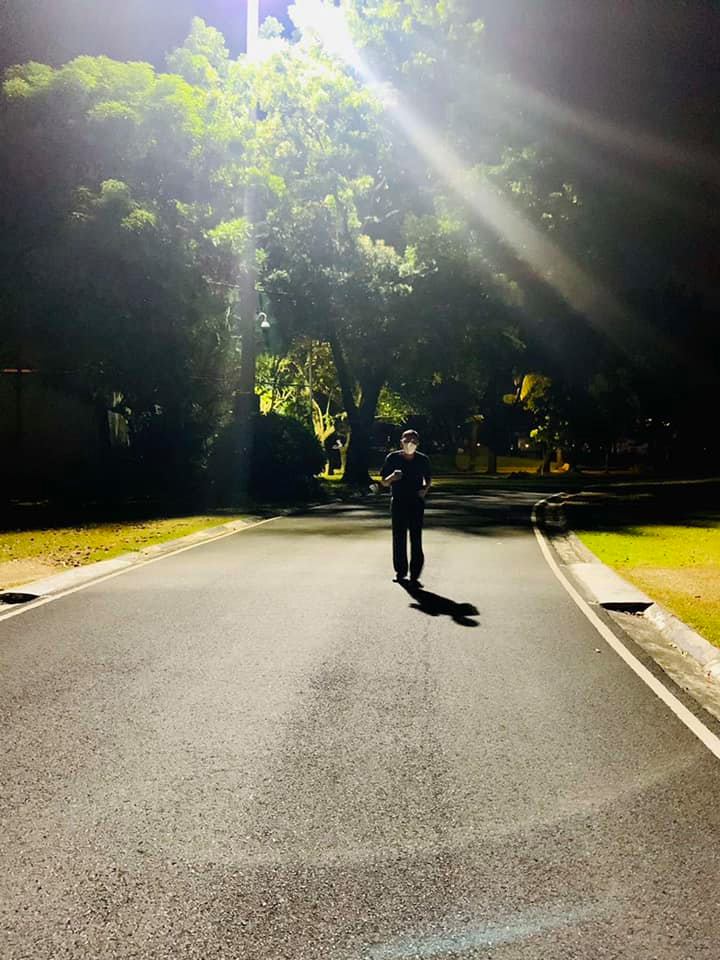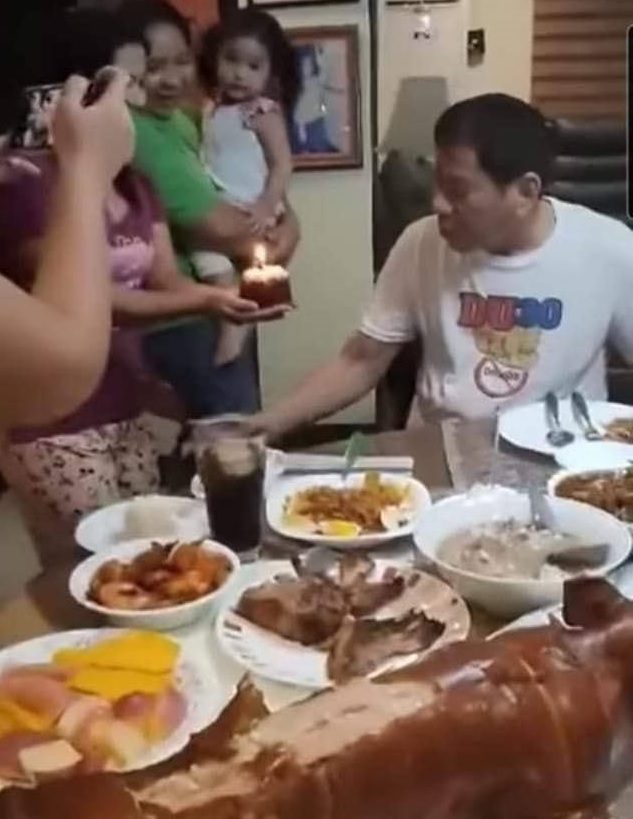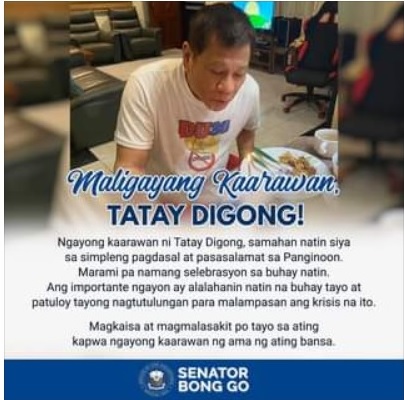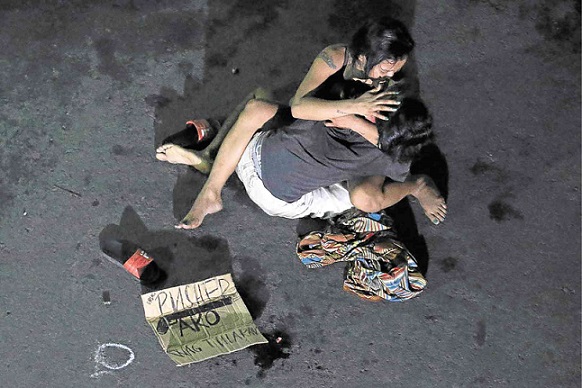By Karol Ilagan
Philippine Center for Investigative Journalism
ON TOP of Bayani Arago’s desk at the Commission on Human Rights National Capital Region (CHR NCR) is a pile of clippings now about an inch thick. The news reports, which Arago began collecting last July 1, tell stories of various police encounters that almost always end up with the same outcome: a drug suspect dead.
“Ito ang mabigat (This is tough),” he says. “Every day, I look at newspapers, and that’s all I see. On Saturdays and Sundays, that’s what I read. So many are getting killed and the only thing I see are killings.”
The bodies are piling up as an apparent result of President Rodrigo R. Duterte’s anti-drug campaign, and Arago, officer-in-charge of CHR NCR’s Protection and Monitoring Division, has made it his duty to keep track of the dead.
So far, he has identified at least 33 incidents related to the campaign that will be investigated motu propio or on the commission’s own initiative. In addition, CHR NCR has assigned priority to its investigation of six complaints filed by the surviving kin of those who had been killed.
The Commission on Human Rights, an independent office created by the Constitution, is the national human rights institution of the Philippines.
Since its formation in 1987, the CHR has investigated human-rights violations involving civil and political rights. It had investigated the 2007 enforced disappearance of activist Jonas Burgos. In 2009, it looked into the summary killings associated with the Davao Death Squad linked to then Davao City Mayor Rodrigo Duterte. More recently, CHR launched one of the first human-rights investigations into the accountability of companies for the adverse impacts of climate change.
A multitude of cases involving crime and security, and women and children has kept the Commission constantly occupied. But the unusually high number of drug deaths since Duterte assumed the presidency three weeks ago is now making CHR work double – perhaps even triple – time to accomplish its tasks.
At CHR NCR, for instance, investigators typically work in teams specific to cases like rubout, torture, and unlawful arrest. These days, majority of the office’s 20 investigators are looking into the extrajudicial killings spawned by Duterte’s war against drugs.
Swamped with work
“Actually, our investigators are now almost working 24/7,” says CHR Commissioner Leah Armamento. “They cannot finish their reports quickly because there’s so much to do.”
Across the country, many of CHR’s regional offices have also shifted their attention on possible human-rights violations in the course of the new administration’s anti-drug campaign. In addition, CHR has formed a national task force specific to extrajudicial killings, which it expects to rise in number.
But apart from issuing statements and making recommendations, there may be little that CHR can do to ensure that justice is being served and the rights of the suspects respected. Already burdened with all sorts of handicaps, including limited resources, it had even managed to irritate Duterte himself early on, prompting him to call CHR Chairman Jose Luis Martin ‘Chito’ Gascon an “idiot.”
In his June 30 inaugural speech, President Duterte also pointedly asked Congress and CHR “to allow us a level of governance that is consistent to our mandate.” He said that as a lawyer and a former prosecutor, he knows the limits of his authority as president and what is legal and what is not.
Maim, not kill
The way Duterte’s war on drugs has unfolded, however, has raised questions on whether due process and fair trial are accorded suspected drug criminals, among other things. Armamento for one says that police officials are supposed to follow standard procedures such as reading a suspect his or her Miranda rights, which include the right to remain silent, right to counsel, and the right to be informed. Likewise, in the event that a suspect poses threat, officers are instructed to maim or render him or her defenseless – but still breathing.
“Hindi mo siya tinatamaan sa ulo, which is fatal, o sa puso (You don’t shoot them in the head or chest, which is fatal),” says Armamento, “You don’t kill them because you have to surrender them to the court and then serve justice.”
What’s alarming for the CHR commissioner is that the police appear to be acting like “eager beavers,” wanting to prove to Duterte that they can comply with his directive to rid the streets of criminals.
“None in our legal system allows killing,” she says.
5 regions, 103 cases
The CHR Task Force created to investigate cases of extrajudicial killings is still collecting data from all the regions. But as of July 25, the regional offices of CHR in NCR, Region I (Ilocos Region), Region II (Cagayan Valley), Cordillera Administrative Region, and Region XII (Soccsksargen) are already investigating or reviewing at least 103 such cases.
The total includes 39 cases in NCR; 27 cases in Region I; 15 cases in Region II; 13 cases in the Cordillera Administrative Region; and nine cases in Region XII.
These numbers include cases where the suspect was killed in a police operation, or by an unidentified assailant.
Of the six regional CHR offices PCIJ called on July 22 and July 25, only NCR had a good number of walk-in complainants. CAR, Region I, Region II, Region IV, and Region XII are mostly, if not only, working on motu propio cases or cases that CHR has decided to pursue on its own.
Whether or not there is a complaint, the CHR is constitutionally mandated to “investigate, on its own or on complaint by any party, all forms of human rights violations involving civil and political rights.” Obviously, though, having a formal complaint helps in building a case. Without someone who has direct knowledge about the case, an investigator would have to start from scratch to get details about the case, as well as leads and pieces of evidence.
Indigents mostly
In Region XII, CHR Officer in Charge Erlan Deluvio says they do not typically receive walk-ins because families of most rights victims are indigents. They wouldn’t have the money to spare for travel to visit their office, he says. All the nine cases CHR Region XII is investigating that are connected to the current administration’s war on drugs are motu propio.
Most of the 13 similar cases under CHR CAR are also motu propio investigations. According to CHR CAR Officer in Charge Romel Daguimol, people in Cordillera are not so inclined to pursue cases because it’s not in their culture to make complaints.
For Director Jacqueline dela Peña of CHR Region IV, personal complaints also depend on how determined the surviving kin is to seek redress from government. She says it depends on the character of the individual, as well as the support he or she gets from the community.
Dela Peña says, however, that they may not receive walk-in complaints arising from the recent spate of killings of drug suspects until after the families of the dead have taken time to grieve.
Deluvio of CHR Region XII says they reach out to the victims’ families and motivate them to participate in the process. Not all would cooperate, however. Some who might consider pursuing a case also change their minds because, Deluvio says, they are also easily intimidated by opposing parties.
Limited resources
It doesn’t also help when law enforcement is uncooperative. Police reports are part and parcel of any investigation, but CHR investigators find it hard to get such records in cases involving the police themselves. This would then mean CHR would have to do more spadework, but like most government offices, this is a body operating on limited resources.
The good news is that starting in 2015, CHR has been getting funds more than what it proposes in the annual budget. For the year 2016, it sought a budget of P428.5 million, and then received P460 million.
Still, among the nation’s five constitutional agencies, CHR has the smallest number of staff. In 2015, it had positions open for 680 but only 526 were filled.
“Kung noon nga, kulang na, lalo na ngayon (The resources were already not enough before, but the lack is even more so now),” Deluvio of CHR Region XII says. CHR Region XII itself has only seven active investigators and two vehicles. An investigator could be working on 12 cases at least at a time, and carpooling has become the norm whenever fieldwork is called for.
In Region IV, where the number of drug-related killings is on the high side, the CHR regional office also has only seven investigators. These investigators cover Laguna, Batangas, Quezon, and the whole of MIMAROPA.
No CHR charter
CHR Region IV Director Dela Peña says they are trying their best to respond to needs, but the influx of cases really makes the job harder. She says the passage of the CHR’s charter, which could pave the way for more resources and personnel, is crucial.
The proposed CHR charter aims to strengthen the Commission’s investigative powers and expand its quasi-judicial powers that include preventive and legal measures such as the issuance of an injuction order, order to transfer persons, and restraining order. But in the last several years, attempts to form this charter have failed in Congress.
Armamento says the drug-related killings has spurred CHR in coordinating with various law groups to help it in any way they can. Among these law groups are the Free Legal Assistance Group, Mabini, and the Philippine Association of Law Schools. CHR has also reached out to the Integrated Bar of the Philippines.
Apart from additional funding, Armamento says the president can also help by stressing the importance of respect for law, human rights, and that no extrajudicial killing should take place during police operations.
“That will help a lot because police officers being part of the executive branch will always obey the president,” she says.
Davao Death Squad
It is still too early to say what will become of CHR’s efforts to respond to the rise of killings of drug suspects. But the results of its investigation into the summary killings in Davao City some seven years ago could be some indication on what could happen next.
The CHR investigation in 2009 had been prompted by a growing concern, inside and outside the country, over the numerous dead bodies turning up across Davao City that time.
The Commission found “a systematic failure on the part of the local officials to conduct any meaningful investigation into said killings, thereby violating the State’s obligation to protect the rights of its citizens.” CHR thus recommended the Office of the Ombudsman to investigate “the possible administrative and criminal liability of Mayor Duterte for his inaction in the face of evidence of numerous killings committed in Davao City and his toleration of the commission of those offenses.”
In March 2012, the Ombudsman found 21 police officers — but not Duterte — guilty of simple neglect of duty. The officers faced penalties ranging from one-month suspension to a fine equal to a month’s salary.
In May 2016, the sole witness in the Department of Justice’s subsequent investigation into the Davao Death Squad left the government’s witness protection program, putting a halt into the probe. In the same month, Duterte won the presidency. — With additional reporting by Davinci Maru, PCIJ, July 2016














